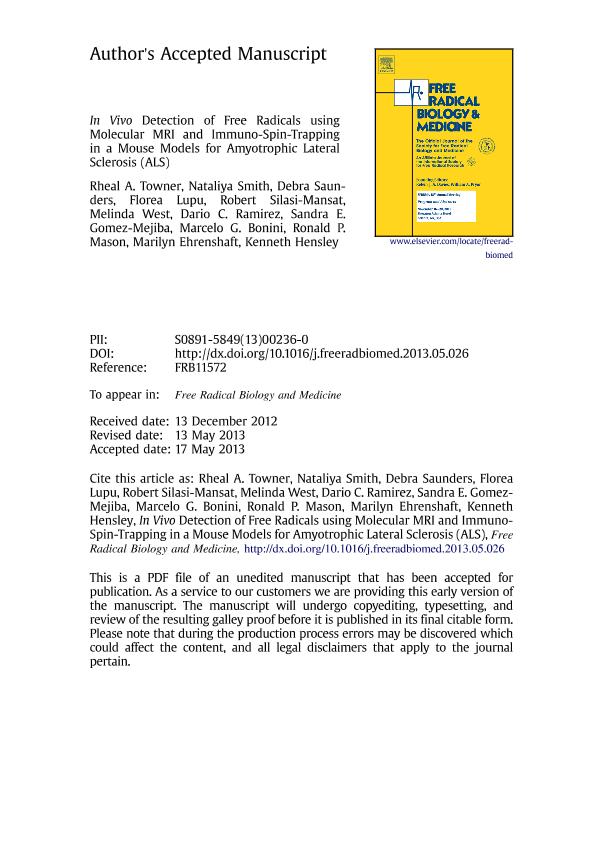Artículo
In Vivo Detection of Free Radicals using Molecular MRI and Immuno-Spin-Trapping in a Mouse Models for Amyotrophic Lateral Sclerosis (ALS)
Towner, Rheal A.; Smith, Nataliya; Saunders, Debra; Lupu, Florea; Silasi Mansat, Robert; West, Melinda; Ramirez, Dario ; Gomez-Mejiba, Sandra Esther
; Gomez-Mejiba, Sandra Esther ; Bonini, Marcelo G.; Mason, Ronald P.; Garteiser P; Ehrenshaft, Marilyn; Hensley, Kenneth
; Bonini, Marcelo G.; Mason, Ronald P.; Garteiser P; Ehrenshaft, Marilyn; Hensley, Kenneth
 ; Gomez-Mejiba, Sandra Esther
; Gomez-Mejiba, Sandra Esther ; Bonini, Marcelo G.; Mason, Ronald P.; Garteiser P; Ehrenshaft, Marilyn; Hensley, Kenneth
; Bonini, Marcelo G.; Mason, Ronald P.; Garteiser P; Ehrenshaft, Marilyn; Hensley, Kenneth
Fecha de publicación:
10/2013
Editorial:
Elsevier
Revista:
Free Radical Biology and Medicine
ISSN:
0891-5849
Idioma:
Inglés
Tipo de recurso:
Artículo publicado
Clasificación temática:
Resumen
Free radicals associated with oxidative stress play a major role in amyotrophic lateral sclerosis (ALS). By combining immuno-spin trapping and molecular magnetic resonance imaging, in vivo trapped radical adducts were detected in the spinal cords of SOD1G93A-transgenic (Tg) mice, a model for ALS. For this study, the nitrone spin trap DMPO (5,5-dimethyl-1-pyrroline N-oxide) was administered (ip) over 5 days before administration (iv) of an anti-DMPO probe (anti-DMPO antibody covalently bound to an albumin–gadolinium–diethylenetriamine pentaacetic acid–biotin MRI contrast agent) to trap free radicals. MRI was used to detect the presence of the anti-DMPO radical adducts by a significant sustained increase in MR signal intensities (p < 0.05) or anti-DMPO probe concentrations measured from T1 relaxations (p < 0.01). The biotin moiety of the anti-DMPO probe was targeted with fluorescence-labeled streptavidin to locate the probe in excised tissues. Negative controls included either Tg ALS mice initially administered saline rather than DMPO followed by the anti-DMPO probe or non-Tg mice initially administered DMPO and then the anti-DMPO probe. The anti-DMPO probe was found to bind to neurons via colocalization fluorescence microscopy. DMPO adducts were also confirmed in diseased/nondiseased tissues from animals administered DMPO. Apparent diffusion coefficients from diffusion-weighted images of spinal cords from Tg mice were significantly elevated (p < 0.001) compared to wild-type controls. This is the first report regarding the detection of in vivo trapped radical adducts in an ALS model. This novel, noninvasive, in vivo diagnostic method can be applied to investigate the involvement of free radical mechanisms in ALS rodent models.
Archivos asociados
Licencia
Identificadores
Colecciones
Articulos(IMIBIO-SL)
Articulos de INST. MULTIDICIPLINARIO DE INV. BIO. DE SAN LUIS
Articulos de INST. MULTIDICIPLINARIO DE INV. BIO. DE SAN LUIS
Citación
Towner, Rheal A.; Smith, Nataliya; Saunders, Debra; Lupu, Florea; Silasi Mansat, Robert; et al.; In Vivo Detection of Free Radicals using Molecular MRI and Immuno-Spin-Trapping in a Mouse Models for Amyotrophic Lateral Sclerosis (ALS); Elsevier; Free Radical Biology and Medicine; 63; 10-2013; 351-360
Compartir



